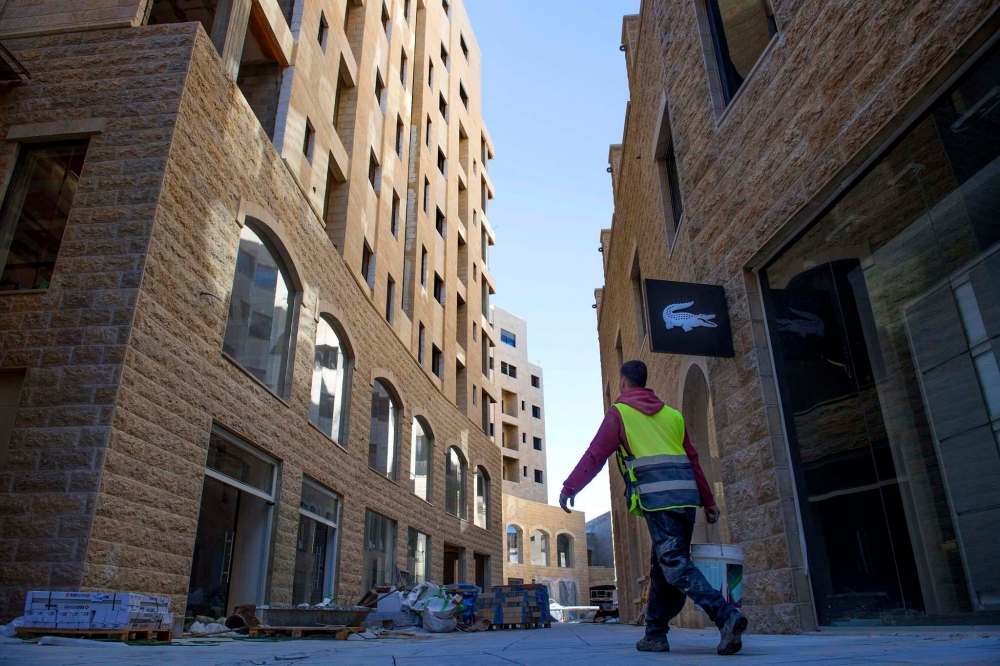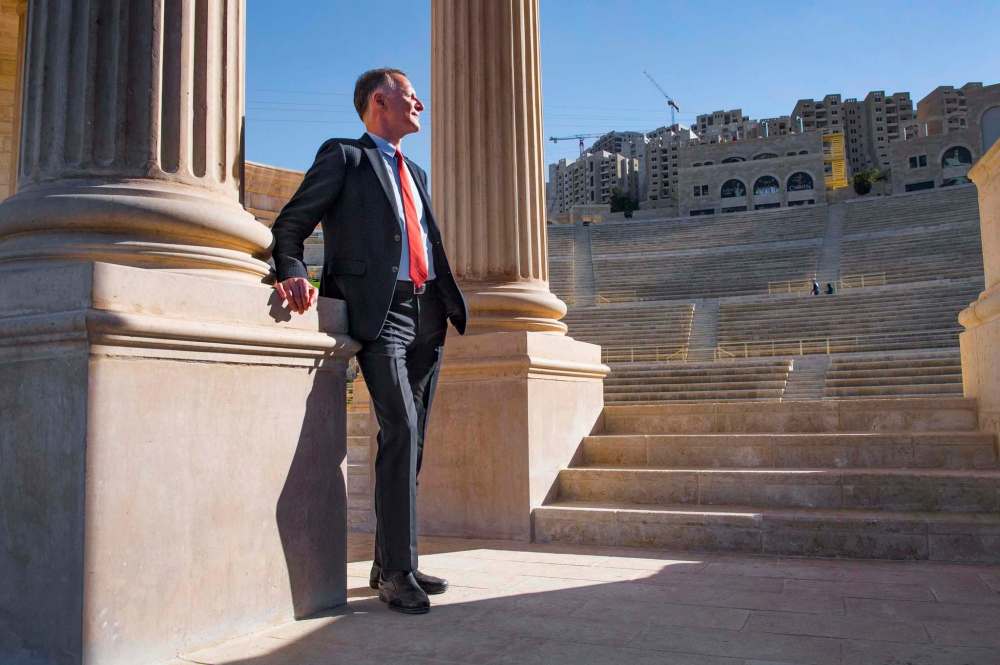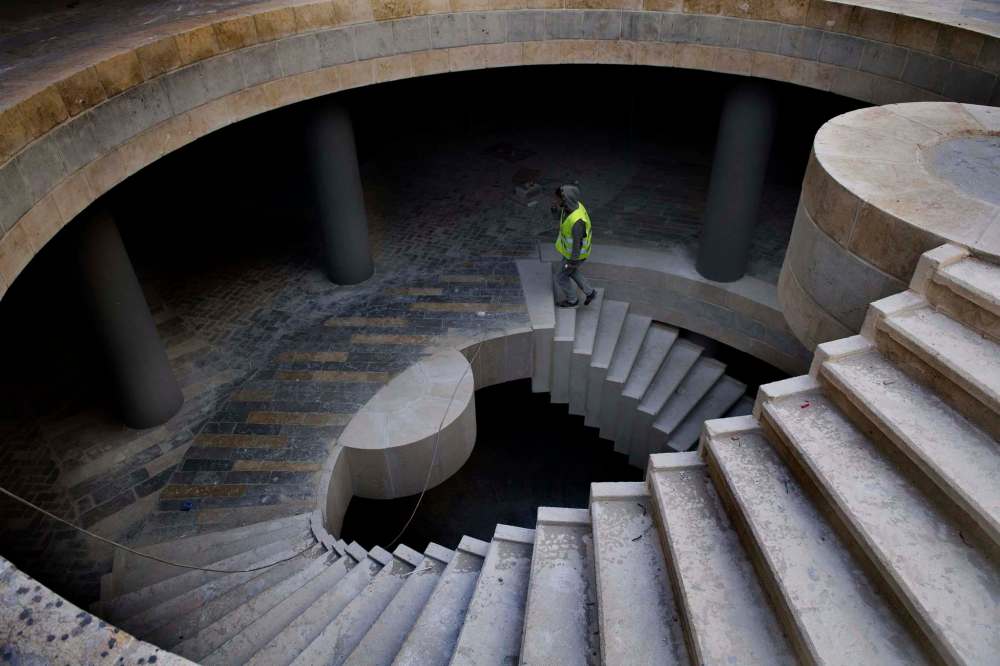New city built on risk
Palestinian metropolis rises in West Bank as Israeli occupation turns 50
Advertisement
Read this article for free:
or
Already have an account? Log in here »
To continue reading, please subscribe:
Monthly Digital Subscription
$1 per week for 24 weeks*
- Enjoy unlimited reading on winnipegfreepress.com
- Read the E-Edition, our digital replica newspaper
- Access News Break, our award-winning app
- Play interactive puzzles
*Billed as $4.00 plus GST every four weeks. After 24 weeks, price increases to the regular rate of $19.95 plus GST every four weeks. Offer available to new and qualified returning subscribers only. Cancel any time.
Monthly Digital Subscription
$4.99/week*
- Enjoy unlimited reading on winnipegfreepress.com
- Read the E-Edition, our digital replica newspaper
- Access News Break, our award-winning app
- Play interactive puzzles
*Billed as $19.95 plus GST every four weeks. Cancel any time.
To continue reading, please subscribe:
Add Free Press access to your Brandon Sun subscription for only an additional
$1 for the first 4 weeks*
*Your next subscription payment will increase by $1.00 and you will be charged $16.99 plus GST for four weeks. After four weeks, your payment will increase to $23.99 plus GST every four weeks.
Read unlimited articles for free today:
or
Already have an account? Log in here »
Hey there, time traveller!
This article was published 03/06/2017 (3192 days ago), so information in it may no longer be current.
RAWABI, West Bank — In the newest city in the wannabe state of Palestine, the developer Bashar Masri is putting the finishing touches on his mall. Not just any mall. “A shopping experience” as luxe as any in Israel, with aspirational sneakers, designer handbags, all the international brands never available here before.
Upmarket consumer options might be ho-hum news in most of the world, but this isn’t any other place.
This is the occupied West Bank, a hornet’s nest of a home to 2.6 million Palestinians and brigades of Israeli soldiers and 400,000 Jewish settlers who have come to claim the land they say was awarded to them by history and God.

Rawabi is the first planned city in the West Bank built by Palestinians for Palestinians, a US$1.4-billion metropolis constructed over the past nine years from bare rock.
The city is the most ambitious project in the Palestinian territories and today is the largest private-sector employer here.
Masri is billing his city on a hill as a revolutionary act, a raised fist with a wallet.
“We will live like normal people,” he said, “until the situation is normal.”
As the Israeli occupation of the West Bank turns 50 years old this month, Israel will celebrate the taking of Jerusalem in its near-miraculous Six-Day War against Arab armies led by Egypt, Syria and Jordan.
On the other side of eight-metre-tall concrete walls that surround Jerusalem, Palestinians will point to an occupation that now appears to be never-ending, with its levers of control ever present: the separation barriers, permit regimes, crowded checkpoints.
If Palestinians cannot get permission to spend their money in Israeli malls, Masri says, let them shop in Rawabi. That is how you build a state.
“And why not? We’ve earned it.”
Rawabi is the counternarrative in the forever conflict in which Palestinians are often portrayed as terrorist or victim, living in refugee camps or dusty villages out of biblical times.
The Palestinians Masri has in mind? All the upwardly mobile dentists, web designers and middle managers who don’t make the news.
The half-built city of Rawabi has been a media darling for years, a tour-bus destination for visiting Norwegian diplomats, Harvard Business School scholars, Arab venture capitalists, adventuresome American Jews, and most recently Coldplay — because nothing like this has been tried here before.
This is what a new Palestinian state could look like, says Masri, a metropolis with a 15,000-seat Roman-style amphitheatre, hosting Broadway shows like Cats, with Palestinian techies typing code for Israeli companies and children learning crisp diction in the British-style Rawabi English Academy.
Masri believes if he offers his people Zumba classes, they will come.
Or it could all fall apart.
The grand opening of Rawabi’s “Q Center” — named after the city’s Qatari backers — was just days away at the end of May, and the open-air promenade was swarming with Palestinian construction crews. Sparks were flying in the night air. Workers going around the clock, hanging signs, stocking shelves.
If his mall succeeds, Masri told me, if his business centre succeeds, there is commerce, there are jobs and people.
Masri also said Rawabi could collapse if the Israeli military government, which runs most of the West Bank, decides to turn off the water or electricity again. The Israelis could shut down the access roads, too. They’ve done it before.
Rawabi could also fail if Palestinians decide they don’t want what Masri is selling. The Palestinian multimillionaire and his Qatari partners are doing all this to make money, for sure.
But they also say let the women of Rawabi jog, with or without veils or fear of social censure. And give the residents speed bumps, yoga classes and the first and only homeowner’s association in the West Bank.
Masri said the often invisible Palestinian middle class deserves the US$125,000 three-bedroom apartments in Rawabi, for sale now at 4.95 per cent mortgage rates, next to a mall stocked with real Wrangler Advanced Comfort Relaxed Fit Jeans, not the counterfeits you find in the bazaars of Ramallah.

If Rawabi thrives? Masri envisions many more Rawabis.
As the Israeli occupation begins its sixth decade, what does it feel like, not just to the Palestinian labourer negotiating with an Israeli soldier at a checkpoint, but a Palestinian master of the universe like Masri, who commutes in private jets and hosted the former United Nations secretary general for lunch at Rawabi?
“I hate the occupation,” Masri said. “It’s evil.”
When he was a teenager, Masri shot the finger at Israeli soldiers. Now he is one of the richest men in the Palestinian territories. When he was young, he went to the United States, got his degree in chemical engineering at Virginia Tech, married an American, had two daughters and was awarded U.S. citizenship.
“I love America,” Masri said.
But he came home to the West Bank in the 1990s. “I dreamed there would be a Palestinian state,” he said. He thought everyone would come home to build it. “But honestly there weren’t many,” he said.
The master plan for Rawabi calls for 8,000 homes and a population of 40,000 on the hilltop, surrounded by areas that today are under partial or complete control — civil or security — of the Israeli military.
If completed, Rawabi will be bigger than all but a handful of the 126 Jewish settlements in the West Bank — communities that are branded illegal by most of the world, although Israel disputes this.
Masri says his apartments are selling briskly and that 3,000 people live in Rawabi today.
But during my visits, his city felt empty to me — hopeful but lonesome.
Only three of the neighbourhoods are finished and construction is ongoing. In the evenings, I walked around the terraced blocks and counted cars in parking lots and lights on in the living rooms. There weren’t many.
I met Jihad Kmail and his wife, Israa Sarsour, a young married couple, both architects, with a toddler. They moved here from Ramallah, where prices for new apartments are even higher. They said they liked the modernity, safety and order of Rawabi. They believe in their investment.
“But we don’t know whether Rawabi will succeed or not,” Sarsour said.
Risk is written all over the project. It’s not just the Israelis.
The Palestinians could launch another uprising. Palestinian youth, goosed by incitement on Facebook, personal trauma, mental illness, dreams of paradise or nationalist fervour, could start stabbing and ramming their family cars into Jews again. Or Hamas cells could kidnap Israeli teens, as they did in the summer of 2014, which sparked the last of three Gaza wars.
It is tough to market high-end apartments to Palestinians during Gaza wars or prisoner hunger strikes or “days of rage” declared by the Palestinian Authority.
It is also possible that the Palestinians will not embrace Masri’s vision of a Western-style middle-class utopia.
He has also set aside land for a Christian church. Masri wants Rawabi to be 10 per cent Palestinian Christian.
A friend showed Masri the hilltop that would become Rawabi. Not exactly waterfront, but a view he could sell.
There were thousands of owners of the land, heirs of plots dating from the Ottoman era, subdivided over generations, many living abroad in the Palestinian diaspora.

This is the only part of his narrative where Masri expresses remorse. He and the Palestinian Authority employed eminent domain for some properties, allowing them to seize land and pay for it.
There’s still bad blood in the surrounding Palestinian villages.
Masri also needed money, too. A lot.
He went on the road, taking 73 meetings before he struck gold with the Qatari Diar Real Estate Investment Company. It put up two-thirds of the money. “It was the luckiest day of my career,” Masri said.
With land and money, Masri needed a road to the site to do the excavation work that would take six years. The road to Rawabi goes through Area C, the 60 per cent of the West Bank where the Israeli military has complete control — not just security, but building permits.
It took four years to get permission from the Israelis to pave the road. Today it is barely wide enough for two cars to pass.
Getting water was harder.
The Israelis wouldn’t provide Rawabi with water because the Palestinian Authority refused to participate in a Joint Water Committee, which approved water for Palestinian villages and Jewish settlements.
Masri said Rawabi was about to collect US$120 million for apartments that were sold, but 452 of the 639 buyers cancelled their deals when Israel balked on water. Solving the water problem took 18 months.
One of Rawabi’s engineers is Shadia Jaradat, 29, and on a recent afternoon, she showed her top-floor apartment off to a visiting Harvard professor and his kids.
“We deserve this lifestyle,” she told me.
“We don’t need everyone to love it, but don’t deny it to others who want it.”
Across the street, construction crews were hammering out the finishing touches on the mall boasting 28 stores and dozens of international brands, with cinemas, clubs and cafes to come.
“If I don’t believe, even for a minute, I will lose all my energy,” she said.
“So I believe.”
— Washington Post

